Reflective Account on PUBH610: Public Health Knowledge and Practice
VerifiedAdded on 2023/03/31
|5
|900
|463
Journal and Reflective Writing
AI Summary
This reflective account details a student's learning experience in the PUBH610 course, focusing on the history and principles of public health. The student reflects on how the course enhanced their understanding of public health, including historical events, ethical frameworks, and practical applications. The account highlights the importance of core public health skills, leadership, and subject-specific knowledge in addressing health inequalities and promoting community health. The student emphasizes the value of case studies in developing critical thinking and management skills, ultimately preparing them for a career in public health. The assignment demonstrates the student's increased commitment to influencing the quality of public health service and effectively responding to public health challenges in the future.
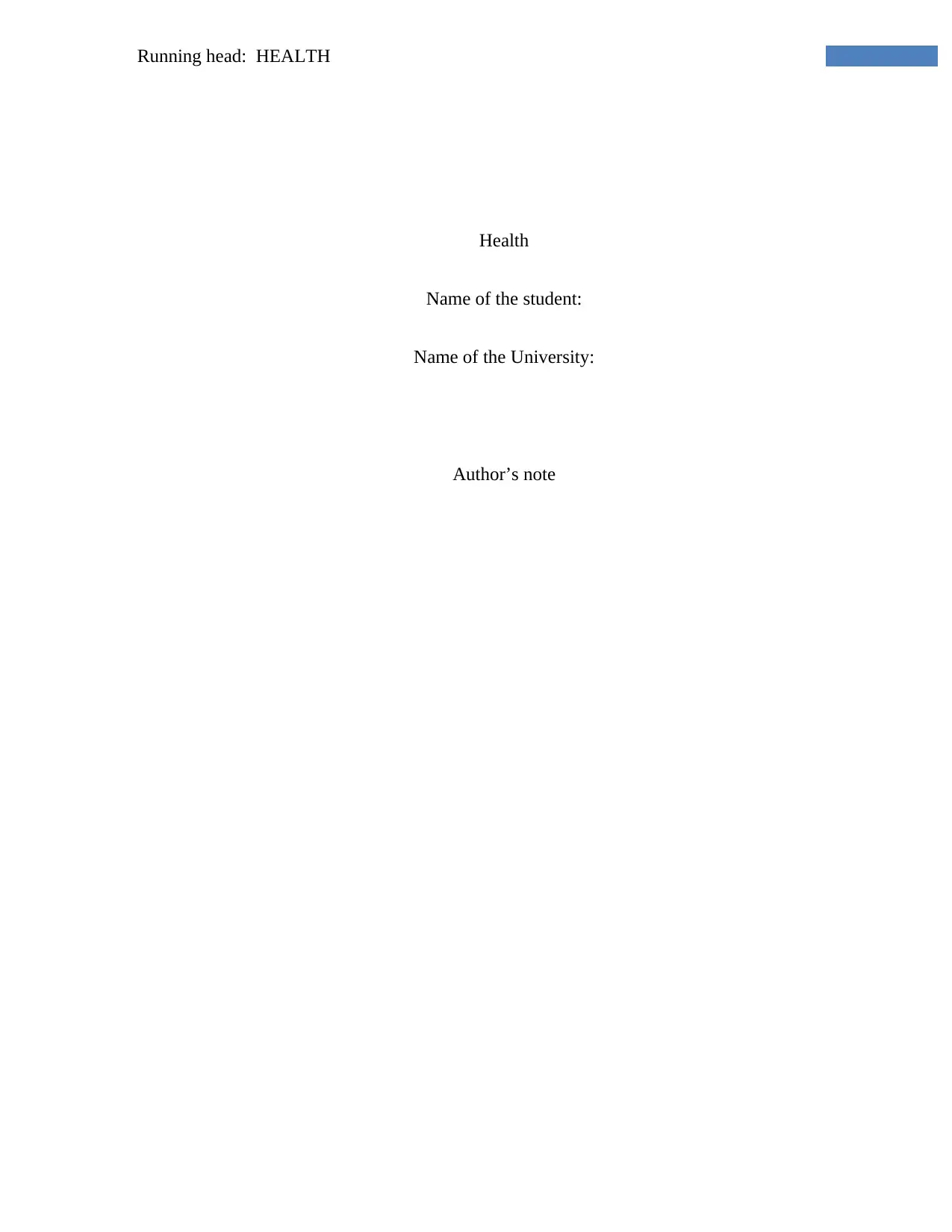
Running head: HEALTH
Health
Name of the student:
Name of the University:
Author’s note
Health
Name of the student:
Name of the University:
Author’s note
Paraphrase This Document
Need a fresh take? Get an instant paraphrase of this document with our AI Paraphraser
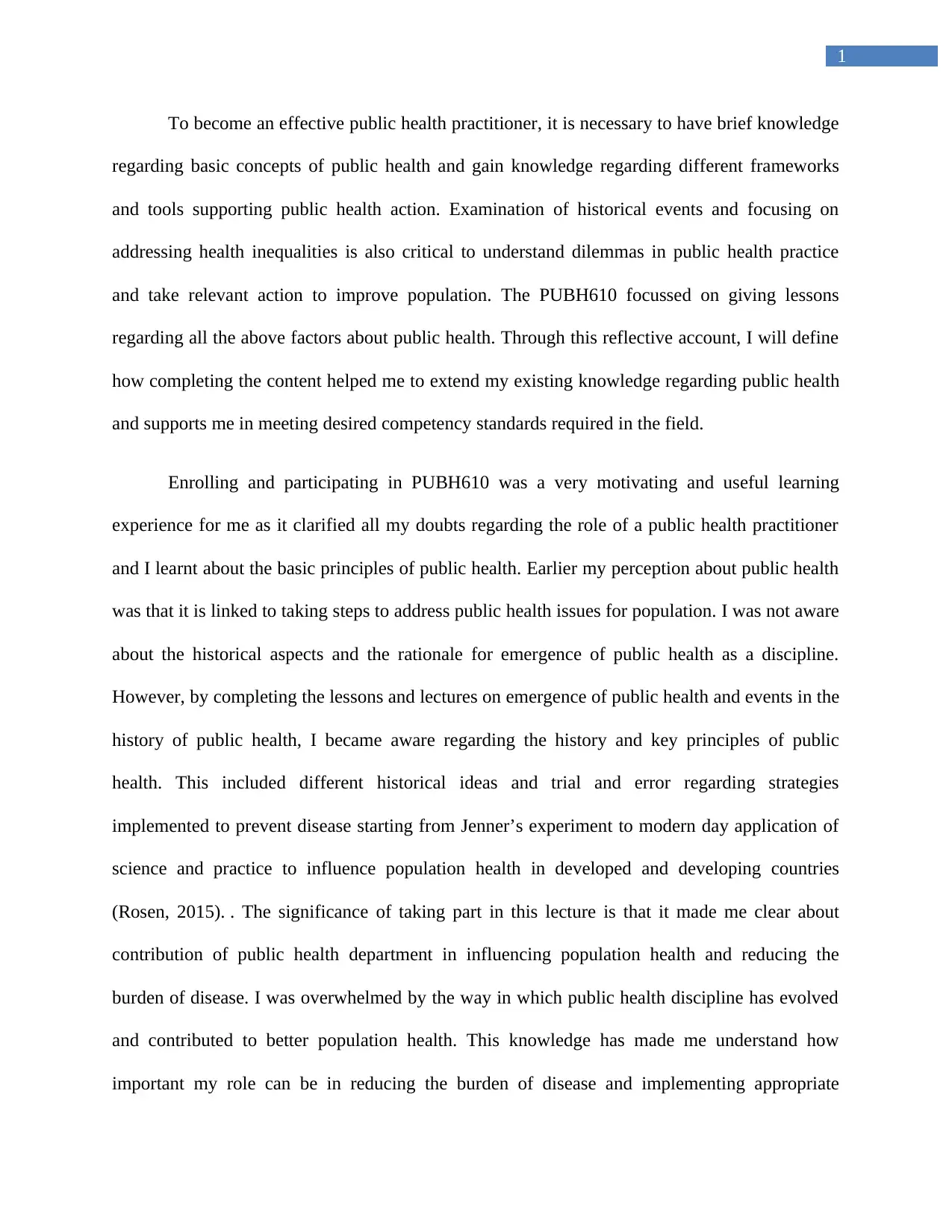
1
To become an effective public health practitioner, it is necessary to have brief knowledge
regarding basic concepts of public health and gain knowledge regarding different frameworks
and tools supporting public health action. Examination of historical events and focusing on
addressing health inequalities is also critical to understand dilemmas in public health practice
and take relevant action to improve population. The PUBH610 focussed on giving lessons
regarding all the above factors about public health. Through this reflective account, I will define
how completing the content helped me to extend my existing knowledge regarding public health
and supports me in meeting desired competency standards required in the field.
Enrolling and participating in PUBH610 was a very motivating and useful learning
experience for me as it clarified all my doubts regarding the role of a public health practitioner
and I learnt about the basic principles of public health. Earlier my perception about public health
was that it is linked to taking steps to address public health issues for population. I was not aware
about the historical aspects and the rationale for emergence of public health as a discipline.
However, by completing the lessons and lectures on emergence of public health and events in the
history of public health, I became aware regarding the history and key principles of public
health. This included different historical ideas and trial and error regarding strategies
implemented to prevent disease starting from Jenner’s experiment to modern day application of
science and practice to influence population health in developed and developing countries
(Rosen, 2015). . The significance of taking part in this lecture is that it made me clear about
contribution of public health department in influencing population health and reducing the
burden of disease. I was overwhelmed by the way in which public health discipline has evolved
and contributed to better population health. This knowledge has made me understand how
important my role can be in reducing the burden of disease and implementing appropriate
To become an effective public health practitioner, it is necessary to have brief knowledge
regarding basic concepts of public health and gain knowledge regarding different frameworks
and tools supporting public health action. Examination of historical events and focusing on
addressing health inequalities is also critical to understand dilemmas in public health practice
and take relevant action to improve population. The PUBH610 focussed on giving lessons
regarding all the above factors about public health. Through this reflective account, I will define
how completing the content helped me to extend my existing knowledge regarding public health
and supports me in meeting desired competency standards required in the field.
Enrolling and participating in PUBH610 was a very motivating and useful learning
experience for me as it clarified all my doubts regarding the role of a public health practitioner
and I learnt about the basic principles of public health. Earlier my perception about public health
was that it is linked to taking steps to address public health issues for population. I was not aware
about the historical aspects and the rationale for emergence of public health as a discipline.
However, by completing the lessons and lectures on emergence of public health and events in the
history of public health, I became aware regarding the history and key principles of public
health. This included different historical ideas and trial and error regarding strategies
implemented to prevent disease starting from Jenner’s experiment to modern day application of
science and practice to influence population health in developed and developing countries
(Rosen, 2015). . The significance of taking part in this lecture is that it made me clear about
contribution of public health department in influencing population health and reducing the
burden of disease. I was overwhelmed by the way in which public health discipline has evolved
and contributed to better population health. This knowledge has made me understand how
important my role can be in reducing the burden of disease and implementing appropriate
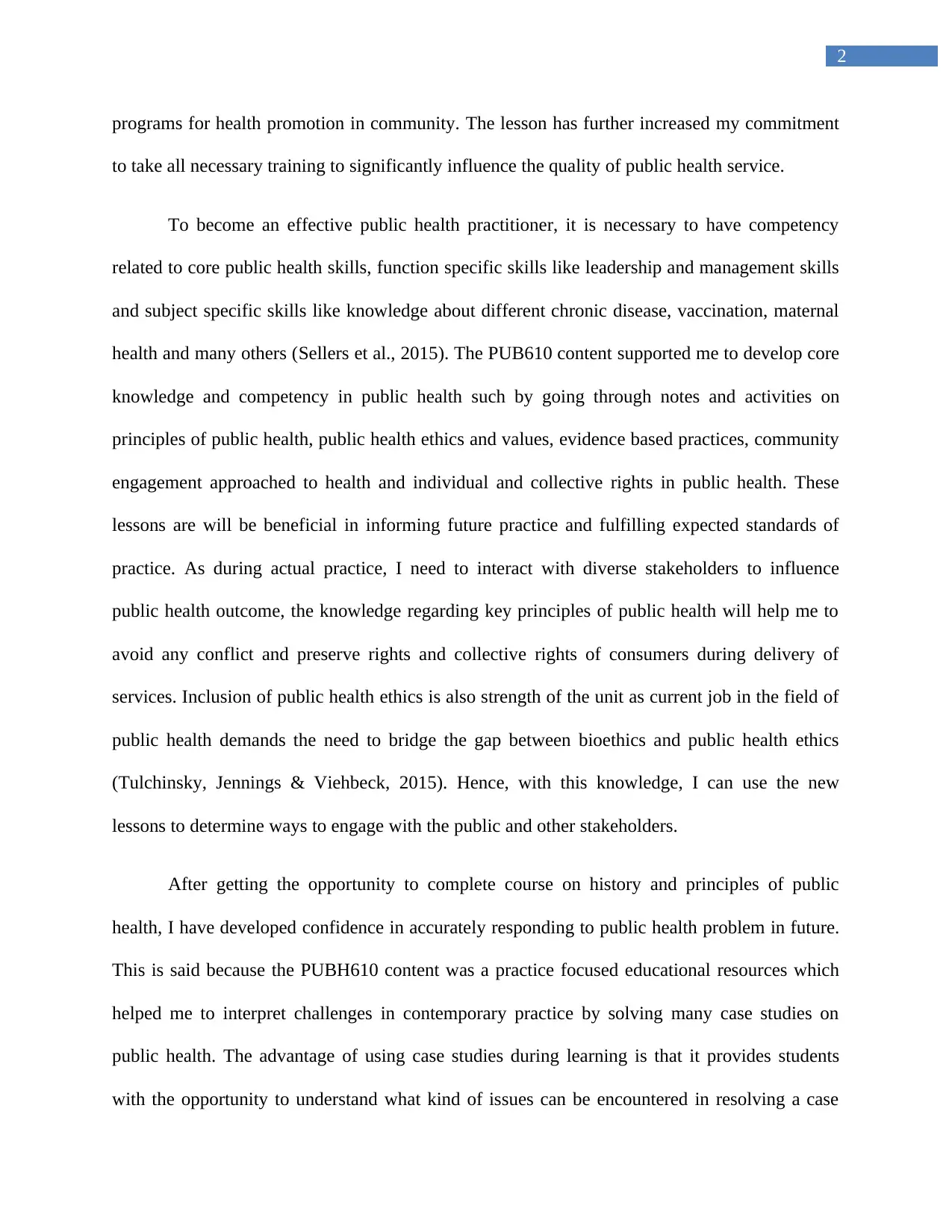
2
programs for health promotion in community. The lesson has further increased my commitment
to take all necessary training to significantly influence the quality of public health service.
To become an effective public health practitioner, it is necessary to have competency
related to core public health skills, function specific skills like leadership and management skills
and subject specific skills like knowledge about different chronic disease, vaccination, maternal
health and many others (Sellers et al., 2015). The PUB610 content supported me to develop core
knowledge and competency in public health such by going through notes and activities on
principles of public health, public health ethics and values, evidence based practices, community
engagement approached to health and individual and collective rights in public health. These
lessons are will be beneficial in informing future practice and fulfilling expected standards of
practice. As during actual practice, I need to interact with diverse stakeholders to influence
public health outcome, the knowledge regarding key principles of public health will help me to
avoid any conflict and preserve rights and collective rights of consumers during delivery of
services. Inclusion of public health ethics is also strength of the unit as current job in the field of
public health demands the need to bridge the gap between bioethics and public health ethics
(Tulchinsky, Jennings & Viehbeck, 2015). Hence, with this knowledge, I can use the new
lessons to determine ways to engage with the public and other stakeholders.
After getting the opportunity to complete course on history and principles of public
health, I have developed confidence in accurately responding to public health problem in future.
This is said because the PUBH610 content was a practice focused educational resources which
helped me to interpret challenges in contemporary practice by solving many case studies on
public health. The advantage of using case studies during learning is that it provides students
with the opportunity to understand what kind of issues can be encountered in resolving a case
programs for health promotion in community. The lesson has further increased my commitment
to take all necessary training to significantly influence the quality of public health service.
To become an effective public health practitioner, it is necessary to have competency
related to core public health skills, function specific skills like leadership and management skills
and subject specific skills like knowledge about different chronic disease, vaccination, maternal
health and many others (Sellers et al., 2015). The PUB610 content supported me to develop core
knowledge and competency in public health such by going through notes and activities on
principles of public health, public health ethics and values, evidence based practices, community
engagement approached to health and individual and collective rights in public health. These
lessons are will be beneficial in informing future practice and fulfilling expected standards of
practice. As during actual practice, I need to interact with diverse stakeholders to influence
public health outcome, the knowledge regarding key principles of public health will help me to
avoid any conflict and preserve rights and collective rights of consumers during delivery of
services. Inclusion of public health ethics is also strength of the unit as current job in the field of
public health demands the need to bridge the gap between bioethics and public health ethics
(Tulchinsky, Jennings & Viehbeck, 2015). Hence, with this knowledge, I can use the new
lessons to determine ways to engage with the public and other stakeholders.
After getting the opportunity to complete course on history and principles of public
health, I have developed confidence in accurately responding to public health problem in future.
This is said because the PUBH610 content was a practice focused educational resources which
helped me to interpret challenges in contemporary practice by solving many case studies on
public health. The advantage of using case studies during learning is that it provides students
with the opportunity to understand what kind of issues can be encountered in resolving a case
⊘ This is a preview!⊘
Do you want full access?
Subscribe today to unlock all pages.

Trusted by 1+ million students worldwide
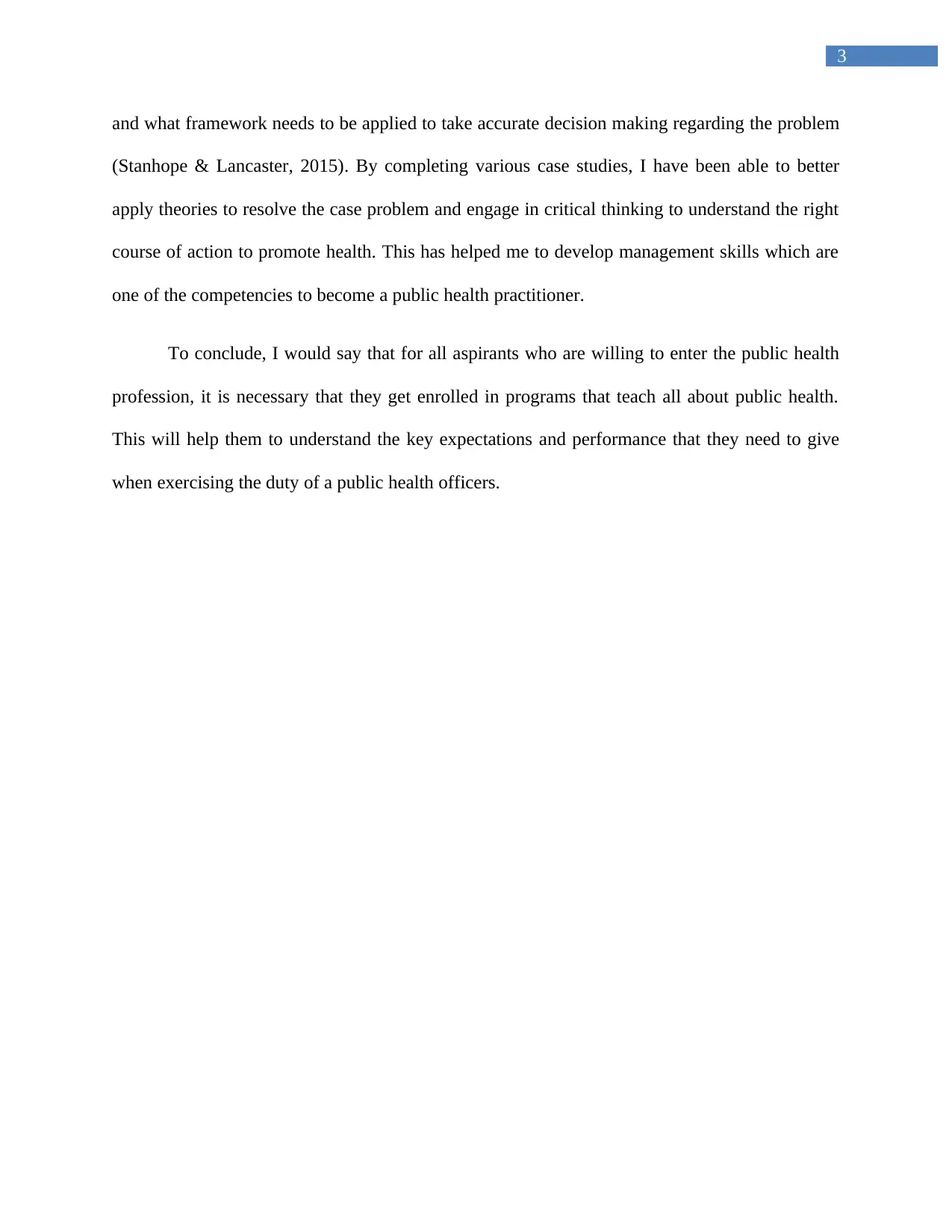
3
and what framework needs to be applied to take accurate decision making regarding the problem
(Stanhope & Lancaster, 2015). By completing various case studies, I have been able to better
apply theories to resolve the case problem and engage in critical thinking to understand the right
course of action to promote health. This has helped me to develop management skills which are
one of the competencies to become a public health practitioner.
To conclude, I would say that for all aspirants who are willing to enter the public health
profession, it is necessary that they get enrolled in programs that teach all about public health.
This will help them to understand the key expectations and performance that they need to give
when exercising the duty of a public health officers.
and what framework needs to be applied to take accurate decision making regarding the problem
(Stanhope & Lancaster, 2015). By completing various case studies, I have been able to better
apply theories to resolve the case problem and engage in critical thinking to understand the right
course of action to promote health. This has helped me to develop management skills which are
one of the competencies to become a public health practitioner.
To conclude, I would say that for all aspirants who are willing to enter the public health
profession, it is necessary that they get enrolled in programs that teach all about public health.
This will help them to understand the key expectations and performance that they need to give
when exercising the duty of a public health officers.
Paraphrase This Document
Need a fresh take? Get an instant paraphrase of this document with our AI Paraphraser
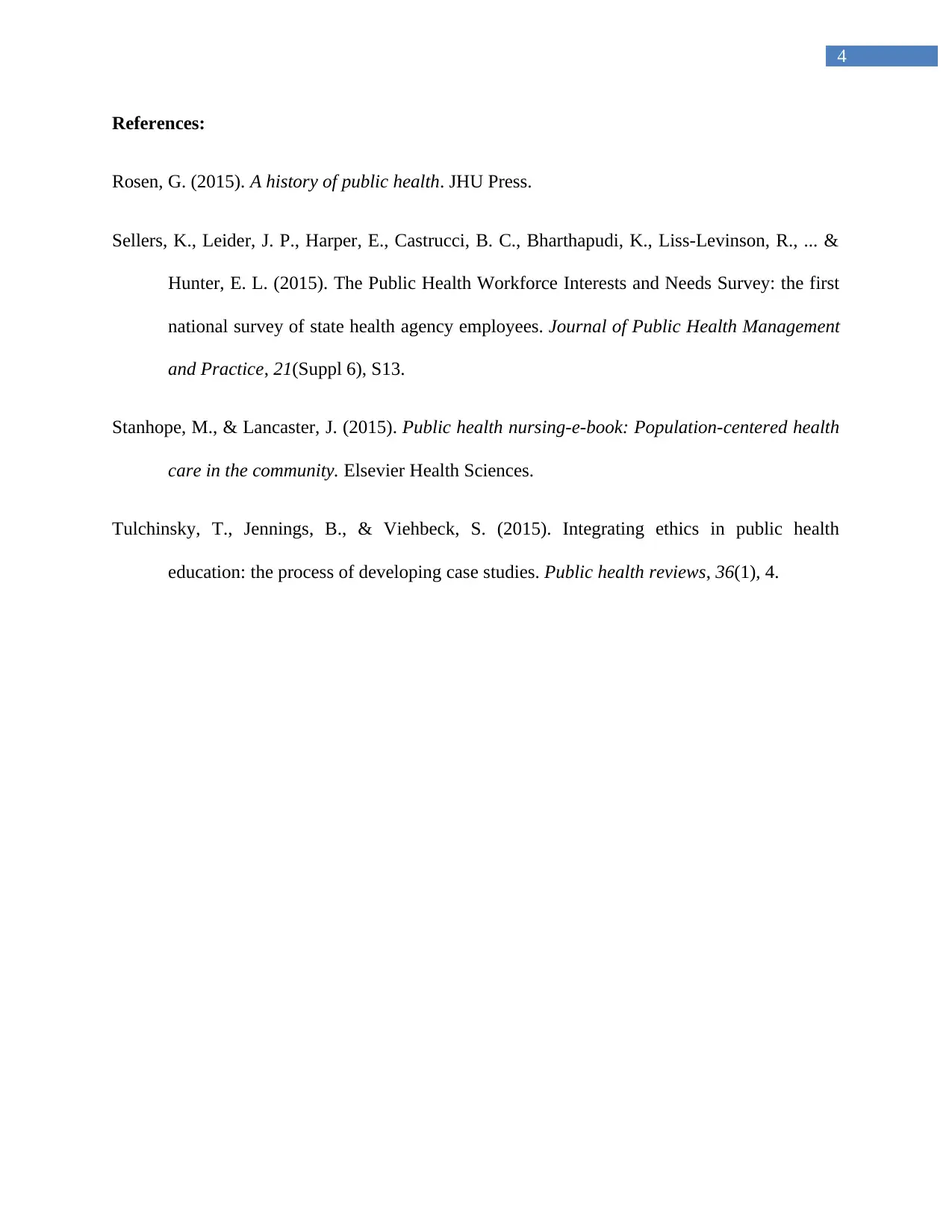
4
References:
Rosen, G. (2015). A history of public health. JHU Press.
Sellers, K., Leider, J. P., Harper, E., Castrucci, B. C., Bharthapudi, K., Liss-Levinson, R., ... &
Hunter, E. L. (2015). The Public Health Workforce Interests and Needs Survey: the first
national survey of state health agency employees. Journal of Public Health Management
and Practice, 21(Suppl 6), S13.
Stanhope, M., & Lancaster, J. (2015). Public health nursing-e-book: Population-centered health
care in the community. Elsevier Health Sciences.
Tulchinsky, T., Jennings, B., & Viehbeck, S. (2015). Integrating ethics in public health
education: the process of developing case studies. Public health reviews, 36(1), 4.
References:
Rosen, G. (2015). A history of public health. JHU Press.
Sellers, K., Leider, J. P., Harper, E., Castrucci, B. C., Bharthapudi, K., Liss-Levinson, R., ... &
Hunter, E. L. (2015). The Public Health Workforce Interests and Needs Survey: the first
national survey of state health agency employees. Journal of Public Health Management
and Practice, 21(Suppl 6), S13.
Stanhope, M., & Lancaster, J. (2015). Public health nursing-e-book: Population-centered health
care in the community. Elsevier Health Sciences.
Tulchinsky, T., Jennings, B., & Viehbeck, S. (2015). Integrating ethics in public health
education: the process of developing case studies. Public health reviews, 36(1), 4.
1 out of 5
Related Documents
Your All-in-One AI-Powered Toolkit for Academic Success.
+13062052269
info@desklib.com
Available 24*7 on WhatsApp / Email
![[object Object]](/_next/static/media/star-bottom.7253800d.svg)
Unlock your academic potential
Copyright © 2020–2026 A2Z Services. All Rights Reserved. Developed and managed by ZUCOL.




